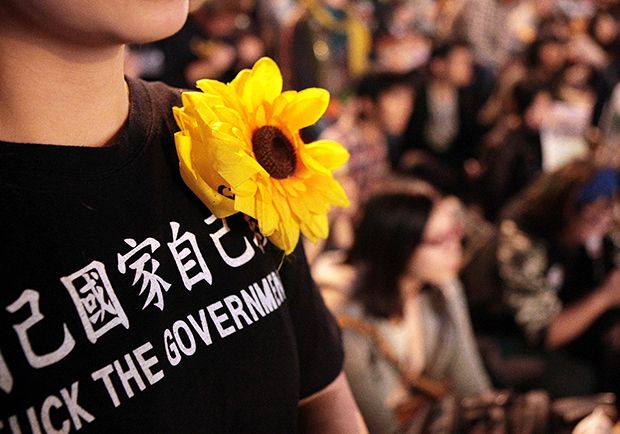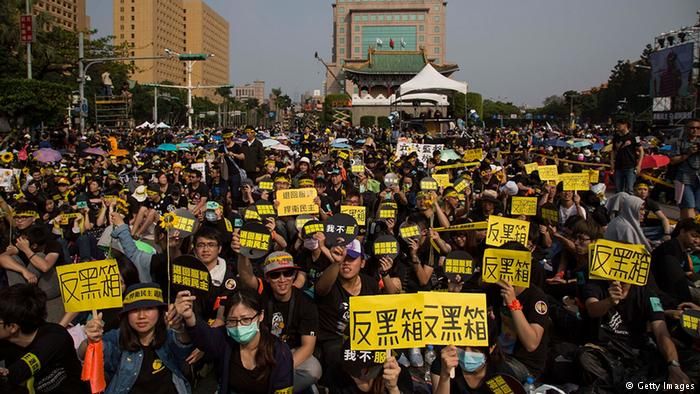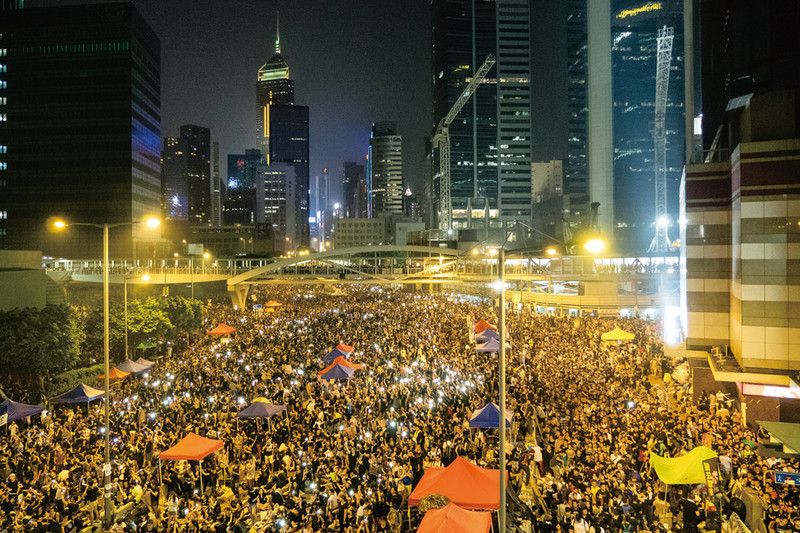Reflections on the Social Movement in Taiwan and Hong Kong on the Fifth Anniversary of the "March 18th Student Movement" in Taiwan
On this day five years ago, a group of Taiwanese college students rushed into the Legislative Yuan at night, demanding that the authorities return the Cross-Strait Agreement on Trade in Services. The agreement was accused of harming Taiwan’s economy and democratic rights. In addition, the then-ruling Kuomintang skipped an article-by-article review and sent it directly to the Legislative Yuan. The actions of those in custody violated "procedural justice". The Occupy Movement that broke out lasted for 24 days, and finally ended with the service trade agreement being postponed and the students withdrawing from the meeting.
This campaign, known as Taiwan's largest "civil disobedience" movement since the 1980s, caused the ruling Kuomintang to suffer huge setbacks in the 2014 and 2016 elections. "White Power" Ko Wenzhe broke ground, and third-power political parties emerged one after another. , Taiwan politics has also opened a new political party rotation. In the same year, the largest "civil disobedience" movement in Hong Kong's history to fight for true universal suffrage and oppose fake democracy broke out in Hong Kong. Democracy failed, and local and independence movements in Hong Kong emerged.

Taiwan's "Sunflower Student Movement" (Photo source: Foresight Magazine)
Looking back at the two social movements, when we talk about heroes in terms of results—from the perspective of whether their demands are realized, both movements can be described as failures. The "March 18 Student Movement" gave way from the initial appeal of "returning the service trade and restarting the negotiations" to "legislation first, then review" - requiring the government to formulate the "Cross-Strait Agreement Supervision Regulations" and then review the "Service Trade Agreement" in detail. Unexpectedly, it was used by the government, and the Ma government preferred to pass the Executive Yuan's version of the supervision regulations rather than the private version to legalize the black-box administrative procedures that were originally opposed by the people. When the government promised to give priority to legislation and postpone the service trade agreement, the team occupying the Legislative Yuan began to prepare for the exit. During this process, "returning the service trade" was misinterpreted by the Kuomintang as returning to the Internal Affairs Committee, and the DPP also interpreted it as returning to the Executive Yuan, which ran counter to the demands of the people to return the service trade agreement to China. In the end, the agreement was shelved and not really returned, and the authorities did not restart negotiations with the CCP. The student movement ended peacefully with the statement "Turn from defense to offense, go out and sow seeds".

Anti-black box service trade parade (Image: Getty Images)
Here, in Hong Kong's "Recapture of the Citizen's Square" campaign, the government's brutal detention of students' unions and student leaders sparked a social backlash. A large number of citizens gathered at Admiralty to support the students. The government brutally used 87 tear gas canisters. More and more people bravely went to the front lines and voluntarily occupied the streets of Hong Kong Island, Kowloon and the New Territories. The main demands of the occupation are to demand that Leung Chun-ying step down, withdraw the "831" decision of the National People's Congress, and implement true universal suffrage with "citizen nomination" for one person, one vote. When the government tried to negotiate with the Students' Federation to no avail, and Leung Chun-ying also stated that he would not resign, the Students' Federation weakened its demands and put forward four demands: "1. Leung Chun-ying has lost his trust in the people and has no authority in governance. Second, the dialogue between students and the government, Political reform is the only issue. 3. Establish equal rights, implement true universal suffrage and true democracy. 4. Under the framework of one country, two systems, Hong Kong issues can be resolved by Hong Kong; Specific demands such as “nomination” were blurred, and the Federation of Students did not realize that after the statement was issued, the citizens would be confused about the purpose of continuing the occupation. Afterwards, the "three sons of Occupy Central" appeared many times and proposed to resume classes or even turn themselves in. Pan-democrats feared that the occupation would go radical and angered the CCP. The demand of "citizen nomination and essential" of the scholar-mind movement began to waver, and the national occupation turned into protesters. Guerrilla warfare with the ebb and flow of power. The government took this to counterattack. The police violently attacked the peaceful demonstrators and eventually cleared the scene.
Two campaigns, one focused on the Legislative Yuan, radiated from the center to "siege" the Kuomintang Party headquarters in various places to pressure the government to withdraw the service trade agreement and safeguard Taiwan's procedural justice and destiny autonomy, and the other was a "decentralized" spontaneous non-discrimination campaign. Violent struggle for true universal suffrage and democratic self-determination. The starting points of the two are different: the former is to use democracy to defend the homeland, uphold procedural justice, and defend democratic values, while the latter is to oppose the fake democratic plan with screening and strive for progressive political change in a mature civil society. The key to success is based on the nature of the object of resistance. As the temporary ruling party, the Kuomintang is a product of the democratic system, and it is not anti-democratic in terms of procedures; while the Communist Party or the Hong Kong government hand-picked by the Communist Party is not authorized by the people. To forcefully suppress people's demands, and even to settle accounts after the fall, is essentially anti-democratic. The Taiwanese social movement developed from this, the third force joined the political map, and the governance strategy of Tsai Ing-wen's era that did not meet the expectations of the people triggered the re-rotation of regional elections. Taiwan's bipartisan politics declined and sank. In contrast, Hong Kong's fate behind the umbrella is a bit unbearable, and the road to democracy is particularly difficult. The long-standing unresolved land and housing issue has made Hong Kong people indifferent to ask more about politics. Wherever they go, there are DQ dissidents, and even the "Socials Ordinance", which was used to deal with the underworld in the colonial era, banned the Hong Kong National Party, which had a few members. Elected seats in the Legislative Council were lost several times, and local and independent organizations under the umbrella died in their infancy. .

Hong Kong's "Umbrella Movement" (Image source: Christian Tribune)
But if we look at the beginning of events not in terms of success or failure, but in terms of the development and influence of the movement, history seems to become fascinating. Both movements inspired a third force in society, the breaking of traditional political antagonisms. In terms of the interpretation of "returning the service trade", blue and green are different, but the more unified demand of the people is to return the agreement directly to China. Only in this way can it be called a real "return", which has created the power of the times and society. Democrats and other groups. Also in Hong Kong, the pro-establishment groups organized various rallies to "anti-Occupy Central", and the pan-democratic camp was also afraid of offending the central government by acting too aggressively. Rise has even begun to take seats in the legislature.
"Sunflower" appeared in a mature democratic system. It does not need to break the old order and establish a new set of institutional things. Diversity and division have become the norm in Taiwanese society. Parades or demonstrations are Taiwan's confirmation of democratic values and mechanisms. s method. The emergence of the "March 18th Student Movement" was due to the fact that the Ma Ying-jeou government violated the democratic consensus of the society, and the police violence was also regarded as a retrogression in history, and only 500,000 people took to the streets. Therefore, when the service trade agreement is suspended and the "Cross-Strait Agreement Supervision Regulations" are enacted, it seems that the demands of the students and the public have been satisfied, and the students should withdraw. But is this the end of the student movement? No, "Sunflower" suspended the black-box conclusion of the China-Taiwan service trade agreement, allowing the public to discover that the democratic system that they thought was stable also needs to repair itself, and society can provide such a possibility. That is, when the government breaks the law and there is no other way to prevent the government from breaking the law, whether the people break into the Legislative Yuan or the Executive Yuan, it is a legitimate defense based on the concept of "civil disobedience" and the protection of human rights. A movement for social justice (the so-called "justice", that is, the legitimacy of the rule of a democratic state must be based on the guarantee of a free life for the people) can be suppressed at will. But it needs to be clear that, whether it is for the students or the masses, occupying the Congress will not dissolve the Congress, much less resolve social differences in place of the rulers. Promoting and consolidating the improvement of the system is the greatest significance of the "March 18th Student Movement". Since then, the people's continuous strengthening of their self-identity, and even the development of the referendum proposal, can be called the "precious legacy" of the "March 18th Student Movement".
The most important keywords after the Umbrella Movement are "local", "self-determination" and "self-determination of destiny". These are the seeds of the Umbrella Movement. It can be seen that this and the Umbrella Movement's demands are already in two directions - when we occupy the In the urban streets, slogans such as "Leung Chun-ying step down", "August March 1st", "Return to me by universal suffrage" were shouted. This is asking the central government to allow Hong Kong people to elect their own chief executive without going through Any screening, hoping that the central government will implement the "Basic Law"'s commitment to universal suffrage, is a pleading statement to the CCP on the basis of Leung Chun-ying's incompetence in governing and only "licking dogs" in Beijing. The success of the Umbrella Movement is its strong spontaneity. It is the common democratic ideal that can unite people. Citizens seek changes within the system because they believe that the CCP will yield to public opinion, keep its promises, and rely on the rule of law. However, the government has repeatedly ignored it, pretended to have dialogue, and threw 87 tear gas canisters in the face of unarmed and peaceful protesters. Guns, let Hong Kong people break the illusion of fighting for democracy within the system. The Umbrella Movement at this time is no longer a simple request for political reform, but Hong Kong people are thinking about 2047, thinking about the future of "my city": afraid of the dark clouds over the city, there will be the cry of "hold your freedom in the wind and rain"; Only by breaking the petition culture can we awaken everyone's responsibility as a Hong Konger. Therefore, the Umbrella Movement does not need a big platform or so-called leaders from beginning to end. The Umbrella Movement has opened the way for citizens to discuss their own destiny and the future of the city, and it has also become the beginning of Hong Kong people's pursuit of self-liberation.
In Taiwan's "March 18" protests, 500,000 people regarded the violent suppression as a step backward. In order to defend the system, more than 1.2 million people in Hong Kong's "Umbrella Movement" occupied all districts in Hong Kong in order to break the system and establish a new political order. It is difficult to say that the two political movements are not tacit understanding of citizens in a parallel time and space, but it is certain that both movements originated from the backlog of multiple social contradictions, and broke out in a concentrated manner under the direct erosion of local values by a force. In Taiwan, the anti-media monopoly, the forced demolition of Tai Po and the rising labor movement prepared the society for the society. In the end, the Ma and Jiang governments signed a black-box agreement with China and the anti-democratic process of forcing the Legislative Yuan to detonate the "sunflower"; Hong Kong also used anti-nationalism , anti-development of the Northeast New Territories, container workers strike and other social movements, coupled with the long-term unresolved housing and land issues and sluggish economic development, under the arbitrary actions of the Leung Chun-ying government, ignoring public opinion, and the central government's direct violation of political commitments, civil disobedience movements have blossomed everywhere. . For Taiwan, whether the expansion of executive power will squeeze public policy and individual freedom is of particular concern to Taiwanese. "March 18" is reminding Taiwan that the process of transitional justice and democratization is still unfinished. How citizens can participate in the design of the system, not just a simple and powerful dichotomous slogan, Taiwan may have a richer imagination in the future. However, when Hong Kong does not want to touch politics, politics has come to the door. The "fake democracy" packaged by the dictator has made Hong Kong people's self-identity more certain. How the civic power inspired by anti-democratic forces can continue to grow under heavy blows seems to be another fierce battle.
Taiwan can transition from social movement to politics, while Hong Kong has encountered many obstacles when transitioning from social movement to politics. Members of the Legislative Council can be deprived of their electoral status because their political statements at the time of the oath are interpreted as "insincere and disrespectful", and candidates waiting to run for election outside the parliament can be subject to "political scrutiny" due to the government's official position. ” and lost the basic right to stand for election, “Hong Kong independence” was labeled as a triad, “self-determination” was equated with “Hong Kong independence”, a wave of social activist youths became political prisoners and were sent to prison, dissidents were banned from entering the country, artistic creation Forced interference... Hong Kong people don't seem to be shouting "true universal suffrage" anymore, but even the existing freedoms are losing ground. This is the "hardship of democracy" for Hong Kong people - just like the unpredictable occurrence of the two movements, it is difficult for the seeds sown by the umbrella to bloom suddenly, but today's opinions may become the mainstream of tomorrow at any time, and the future can be expected. In Hong Kong, the people are still hiding dragons and crouching tigers, and Hong Kong people are still farming.
The reflection of the social movement, in the constant exposure to the movement, allows the occurrence of the picture and the thinking to hedge again and again. It may be disappointing that the government of Taiwan and Hong Kong ugly won the battle, but the dictator behind it was unscathed. But civil rights are in me, fighting for issues bravely, I believe that the rational judgment of the people will resonate in all corners of society and "a thousand waves in one corner". The result of a dictator ignoring or even suppressing public opinion can only be that public opinion will be taken away again. On the streets, the reflections and the evolution of value choices brought about by the movement again and again will eventually lead to untimely institutional changes. At the time when Taiwan's political system is becoming stable and Hong Kong's "fifty years unchanged" limit is about to pass halfway, the reflection and precipitation of the two movements will make the future of Taiwan and Hong Kong full of possibilities.
Like my work? Don't forget to support and clap, let me know that you are with me on the road of creation. Keep this enthusiasm together!

- Author
- More